#covid status in china
Text
China censors report on this city seeing half a million Covid cases a day
China censors report on this city seeing half a million Covid cases a day
Amid the reports of crematoriums being flooded with bodies and hospitals running out of space, a Chinese health official claimed that half a million people in Qingdao city are being infected with Covid every day.
New Delhi,UPDATED: Dec 24, 2022 12:16 IST
Patients lie on their beds at Central Hospital in Zhuozhou city in northern China’s Hebei province on Wednesday, Dec. 21, 2022. Nearly three…
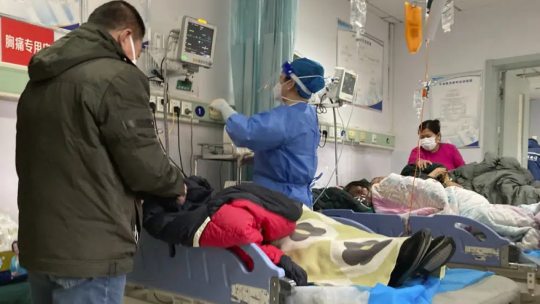
View On WordPress
#cases#censors#China#city#corona virus outbreak#coronavirus live cases#coronavirus live news updates#coronavirus live update#coronavirus live update in india today#coronavirus live update india#Covid#covid case in world#covid cases in india#covid live update#covid spike#covid status in china#current covid cases#day#india covid live updates#india covid-19 live updates#million#new covid guidelines#Report
0 notes
Text
COVID-19's long-term effects on the body: an incomplete list
COVID’s effect on the immune system, specifically on lymphocytes:
NYT article from 2020 (Studies cited: https://www.biorxiv.org/content/10.1101/2020.05.18.101717v1, https://www.biorxiv.org/content/10.1101/2020.05.20.106401v1, https://www.unboundmedicine.com/medline/citation/32405080/Decreased_T_cell_populations_contribute_to_the_increased_severity_of_COVID_19_, https://www.medrxiv.org/content/10.1101/2020.06.08.20125112v1)
https://www.biorxiv.org/content/10.1101/2022.01.10.475725v1
https://www.science.org/doi/10.1126/science.abc8511 (Published in Science)
https://www.ncbi.nlm.nih.gov/pmc/articles/PMC9057012/
https://www.forbes.com/sites/williamhaseltine/2022/04/14/sars-cov-2-actively-infects-and-kills-lymphoid-cells/
https://www.cleveland.com/news/2022/10/in-cleveland-and-beyond-researchers-begin-to-unravel-the-mystery-of-long-covid-19.html
SARS-CoV-2 infection weakens immune-cell response to vaccination: NIH-funded study suggests need to boost CD8+ T cell response after infection
https://www.merckmanuals.com/professional/hematology-and-oncology/leukopenias/lymphocytopenia
https://thetyee.ca/Analysis/2022/11/07/COVID-Reinfections-And-Immunity/
Dendritic cell deficiencies persist seven months after SARS-CoV-2 infection
https://www.frontiersin.org/articles/10.3389/fimmu.2022.1034159/full
https://www.n-tv.de/politik/Lauterbach-warnt-vor-unheilbarer-Immunschwaeche-durch-Corona-article23860527.html (German Minister of Health)
Anecdotal evidence of COVID’s effects on white blood cells:
https://twitter.com/DrJohnHhess/status/1661837956875956224
https://x.com/TristanVeness/status/1661565201345564673
https://twitter.com/TristanVeness/status/1689996298408312832
Much more if you speak to Long Covid patients directly!
Related information of interest:
China approves Genuine Biotech's HIV drug for COVID patients
COVID as a “mass disabling event” and impact on the economy:
https://www.ctvnews.ca/health/report-says-long-covid-could-impact-economy-and-be-mass-disabling-event-in-canada-1.6306608
https://x.com/inkblue01/status/1742183209809453456?s=20
COVID’s impact on the heart:
https://www.dailystar.co.uk/news/world-news/deadly-virus-could-lead-heart-31751263 (Research from: Japan's Riken research institute)
https://www.brisbanetimes.com.au/national/queensland/unlike-flu-covid-19-attacks-dna-in-the-heart-new-research-20220929-p5bm10.html
https://www.mdpi.com/2077-0383/12/1/186
https://medicalxpress.com/news/2023-04-mild-covid-effects-cardiovascular-health.html
https://publichealth.jhu.edu/2022/covid-and-the-heart-it-spares-no-one
https://www.bhf.org.uk/informationsupport/heart-matters-magazine/news/coronavirus-and-your-health/is-coronavirus-a-disease-of-the-blood-vessels (British Heart Foundation)
COVID’s effect on the brain and cognitive function:
https://www.openaccessgovernment.org/article/brain-infection-by-sars-cov-2-lifelong-consequences/171391/
https://www.cidrap.umn.edu/covid-19/study-shows-covid-leaves-brain-injury-markers-blood
https://www.theguardian.com/world/2020/jul/08/warning-of-serious-brain-disorders-in-people-with-mild-covid-symptoms
Cognitive post-acute sequelae of SARS-CoV-2 (PASC) can occur after mild COVID-19
Neurologic Effects of SARS-CoV-2 Transmitted among Dogs
https://journals.lww.com/nsan/fulltext/2022/39030/neurological_manifestations_and_mortality_in.4.aspx
https://www.salon.com/2023/06/17/new-evidence-suggests-alters-the-brain--but-the-extent-of-changes-is-unclear/
https://www.scientificamerican.com/article/covid-virus-may-tunnel-through-nanotubes-from-nose-to-brain/
https://neurosciencenews.com/post-covid-brain-21904/
https://www.thelancet.com/journals/lanpsy/article/PIIS2215-0366(22)00260-7/fulltext
https://medicalxpress.com/news/2022-08-covid-infection-crucial-brain-regions.html
https://news.ecu.edu/2022/08/04/covid-parkinsons-link/
Covid as a vascular/blood vessel disease:
https://www.salon.com/2020/06/01/coronavirus-is-a-blood-vessel-disease-study-says-and-its-mysteries-finally-make-sense/
https://www.salon.com/2023/12/27/brain-damage-caused-by-19-may-not-show-up-on-routine-tests-study-finds/
https://www.nih.gov/news-events/news-releases/sars-cov-2-infects-coronary-arteries-increases-plaque-inflammation
https://www.mdpi.com/2077-0383/12/6/2123
https://www.sciencedaily.com/releases/2021/10/211004104134.htm (microclots)
Long Covid:
Post-COVID-19 Condition in Canada: What we know, what we don’t know, and a framework for action
https://www.ctvnews.ca/health/coronavirus/more-than-two-years-of-long-covid-research-hasn-t-yielded-many-answers-scientific-review-1.6235227
https://www.cbc.ca/news/canada/london/cause-of-long-covid-symptoms-revealed-by-lung-imaging-research-at-western-university-1.6504318
https://www.cbc.ca/news/canada/montreal/long-covid-study-montreal-1.6521131
https://news.yale.edu/2023/12/19/study-helps-explain-post-covid-exercise-intolerance
Other:
- Viruses and mutation: https://typingmonkeys.substack.com/p/monkeys-on-typewriters
Measures taken by the rich and world leaders
Heightened risk of diabetes
https://jamanetwork.com/journals/jama/fullarticle/2805461
https://www.nature.com/articles/d41586-022-00912-y
Liver damage:
https://timesofindia.indiatimes.com/city/mumbai/46-of-covid-patients-have-liver-damage-study/articleshow/97809200.cms?from=mdr
tl;dr: covid is a vascular disease, not a respiratory illness. it can affect your blood and every organ in your body. every time you're reinfected, your chances of getting long covid increase.
avoid being infected. reduce the amount of viral load you're exposed to.
the gap between what the scientific community knows and ordinary people know is massive. collective action is needed.
#putting this somewhere at least as reference for... somebody hopefully#covid#disability#y'all. it is bleak out there but some very good people are doing their best to help#we need as many people aware and helping as possible
460 notes
·
View notes
Text
"The first session of the 118th Congress was one of the least productive in the body’s history. Only 22 bills were signed into law this year by the president — by far the lowest total since at least 1993, the first year for which the National Archives have data. (For comparison, the next least productive year during this timespan was in 2013, when 72 bills became law.)
Despite the slow year, members nonetheless found time to introduce an abundance of bills relating to the threat of China, which was the focus of hearings in committees ranging from Financial Services to the Judiciary committee, and of legislation concerning everything from fentanyl distribution to TikTok.
In 2023, members introduced 616 pieces of legislation that contain a variation of the word “China” — more than 3.5 for every day that Congress was in session on average. That’s already more than any two-year congressional session, except for the 117th Congress (2021-2022; 860 bills) and the 116th (2019-2020; 620 bills), according to a search of the congressional record.
One of the few “accomplishments” in Congress this year was the formation of the Select Committee on the Strategic Competition Between the United States and the Chinese Communist Party — which was almost instantly dubbed the “tough on China committee” — in January."[...]
Members of Congress introduced at least nine bills aimed at restricting foreign ownership of agricultural land in the United States. As RS has explained, these efforts are not always logical, even if there are some legitimate national security concerns over China or other nations buying up farmland.[...]
Rep. Andy Ogles (R-Tenn.) and five co-sponsors introduced the “Defund China’s Allies Act” to “prohibit the availability of foreign assistance to certain countries that do not recognize the sovereignty of Taiwan,” aimed at 21 countries in Central America and the Caribbean. The bill argues that the “United States efforts to condemn these countries’ willing diplomatic shift toward a genocidal government is undermined by an incomprehensible adherence to the so-called ‘One China’ policy, on terms dictated by the Chinese Communist Party,” implicitly calling for an end to the policy that has maintained peace in the Taiwan Strait for decades.[...]
bills introduced by Sen. Marco Rubio (R-Fla.), Reps. John Curtis (R-Utah), and Chris Pappas (D-N.H.) [...] would have renamed the Taipei Economic and Cultural Representative Office (TECRO) in Washington, D.C. to the Taiwan Representative Office, because it “better reflects its status as Taiwan’s de facto diplomatic mission to the United States.”
That was only one of many bills that were purely symbolic and antagonizing, including one that demanded that Beijing “must be held financially liable for $16,000,000,000,000,” because of its responsibility in the outbreak of the Covid-19 pandemic and a resolution that declared China to be the biggest threat to freedom in the world.
“Whereas it is the opinion of Congress that the Chinese Communist Party is the greatest threat to freedom and to the free world,” reads the text, introduced by Rep. George Santos (R-N.Y.). “Be it Resolved by the House of Representatives (the Senate concurring), That Congress agrees that the Chinese Communist Party is the greatest threat to freedom and to the free world.” That’s the entire resolution.
27 Dec 23
101 notes
·
View notes
Note
https://x.com/halalcoholism/status/1781092014391734595?s=46
In my senior year, I read a book about a Khmer Rouge child soldier and survivor
He said heard his little brother died from starvation while asking where he was
Evil my friend pure evil
Psst, Jewish people, the left defense of the Khmer Rouge is what would happen if the Nazis didn’t attack England and France. Sorry I think people don’t understand that Nazis had a eat the rich mentality
Also people said the cia funded the Cambodian genocide
Oh leftists
The American agencies are INCOMPETENT AS FUCK
If we know about the cia connections to bin Laden, then anti commies cia hating people would put that shit down hard.
Seriously…do they talk to any working class American? I mean ever heard that in cops shows. The cops are weary when they learn the cia is involved?
Almost like the cia makes everything a living hell for the average American….hmm why did we go to Vietnam again? Why did so many Americans have to be at the mercy of Vietnam’s vets with ptsd with little to no mental resources again?
Why does the cartels have military grade weapons that no American civilians can buy?
Why didn’t the sniper try to kill lbj as well?
Why did the crack epidemic hit my community the worst? How the fuck inner cities thugs got military grade weapons too?
There a reason why American sci-fi since 70’s have an agency that based off the cia to pull middle fingers to. Not a Trekkie, but didn’t the next generation crate a federation cia call sector 9 or something?
Gonna run those tweets on their own, since that will bring discourse™
In my senior year, I read a book about a Khmer Rouge child soldier and survivor
He said heard his little brother died from starvation while asking where he was
Evil my friend pure evil
Fairly large Cambodian community in my town, I'm sure they'd love a word with the idiots that think the khmer rouge was anything but evil,
Psst, Jewish people, the left defense of the Khmer Rouge is what would happen if the Nazis didn’t attack England and France. Sorry I think people don’t understand that Nazis had a eat the rich mentality
They were a form of socialists so ya, not sure how many of them realized they were, but ya.
Also people said the cia funded the Cambodian genocide
Oh leftists
The American agencies are INCOMPETENT AS FUCK
They managed to pull off a few things in South America, they wouldn't have funded a communist state though, not one that small at least, need something that would be more than a minor annoyance for china or the soviets.
If we know about the cia connections to bin Laden, then anti commies cia hating people would put that shit down hard.
ya he was fighting commies, Afghanistan the graveyard of empires
Why does the cartels have military grade weapons that no American civilians can buy?
ATF gunwalking scandal Thanks Obama.
Why didn’t the sniper try to kill lbj as well?
Who would have gotten us stuck in Nam for years and years if not for lbj though?
Why did the crack epidemic hit my community the worst? How the fuck inner cities thugs got military grade weapons too?
That was the FBI, CIA operates outside of our border, allegedly. It's also a contributing factor to the black community having such a low vaccination rate during covid, alphabet soup news outlets never really brought it up because that's not a way to demonize white people so they don't care.
There a reason why American sci-fi since 70’s have an agency that based off the cia to pull middle fingers to. Not a Trekkie, but didn’t the next generation crate a federation cia call sector 9 or something?
I think there was a episode of DS9 that went into that when Sisko went back in time on earth, but don't quote me on that.
_________________
Got this one out at least, still waiting to hear if it's pick up day or not.
I'm gonna shitpost for a bit tho I think.
11 notes
·
View notes
Note
hi gp!! i love ur acc hehehe i just wanted to ask a rlly quick question! w/ all the tour announcements recently (matt&jonathan returning to the world tour and places like vienna, etc. having productions), why do you think cameron&co haven’t announced another US tour? like exactly how it used to be on bway but on the road? idk if im the only one, but i’ve been lowkey waiting for an announcement since bway closed bc i feel like there’s a cash grab opportunity there?? i'm surprised they haven't <3
Hey, thanks for enjoying the blog!
As for your question: my honest answer to "why hasn't a US tour been announced" is simply "because it's not related to the other productions", at least not directly so. Like, I don't really see how the announcements of a World Tour and the Vienna production starting up (it was announced a while ago) should mean that a US tour must be announced and if it isn't, then something is going on. To me, all it means is that the pieces fell into place for some productions and that they're still working on the pieces for another. (And it is a lot of pieces: you have to negotiate with theaters, find or build set pieces and costumes and wigs, get cast and crew and orchestra, build up hype and marketing, and so on and so forth).
And really, if you look at some of these productions, there are still gaps of over a year or more between them (and it has been less than a year since the Broadway production closed). In the case of the Vienna production, even though it was announced before the Australian tour had even closed, there was still over a year between when the news broke (January 2023) and when it opened (March 2024). This was also a case where the higher-ups knew the Australian production would be over at a certain date and that the sets and costumes would be readily available for the next production. As far as I know, the production is also only going to be in Vienna, not touring (which is a bit odd since the restaged sets are made for touring, but whatever), so that also means only one theater to negotiate and set dates for performances.
And in the case of the World Tour, again, this was something where all the pieces were set up and just had to fall into place: the Chinese tour was over, which meant sets and costumes are now available; the World Tour had been all set to go to China before it was paused to begin with, so now that restrictions are lifted, they can just take off from there; the World Tour has always been popular in China and the other countries in Asia that they visit, so there's demand; and apparently several cast members are available, so they didn't even have to do much casting. I don't know how contracts and negotiations are done in this kind of situation (it is a bit of an oddball one), but it seems it all worked out here.
That doesn't mean I don't think there will be a US tour coming soon, as you say it's a huge opportunity to make money, but I do think that they need to get all the pieces together. For one thing, I don't think it's going to exactly how it was on Broadway, either before the COVID shutdown or after it reopened; I think that it'll be close to the tour that ran briefly in the UK in 2020, with the Pegasus statue, reduced orchestra, some more modifications in blocking and design, that kind of thing. But of course, the question is, are there sets available for that and if not, they need to build or modify ones, have they finished negotiating with theaters for all that, and then the necessary time to drum up hype and marketing. That can take time!
And to look at a similar example in the US: look at when Phantom's 3rd national tour closed (October 2010) and the 4th one was announced and started (November 2013). If you want to argue that that's because the restaged tour was going around the UK before going to the US (which it was), well, the UK tour was still announced nearly a year after the US tour had closed (October 2011) and with an opening a few months after that (February 2012).
So anyway, that's my long-winded answer: one production starting up in one part of the world, doesn't necessarily indicate anything about a production in another part of the world. While it's all under the heading of Phantom and RUG, there are still many different people and many different companies working through all the different facets that go into making a show possible.
8 notes
·
View notes
Text
Willing to say now I was wrong about the protests in China - I thought they would be outlasted, pushed down, and then quietly zero-covid would be abandoned a bit later slowly, to send the message that protests dont work. Instead they massively succeeded, and the Chinese government has done the most abrupt about face possible in abandoning virtually every aspect of the program. You even have some peak Orwell in the state propaganda channels advertising how Omnicron is mild and shouldn't be feared in the same exact spaces preaching victory or death a week before.
My best hypothesis for the extremity of the response is that the inner circle was far more divided over zero covid than we thought. I have seen some say the switch is a sign of the 'tyranny of xi', that he snapped his fingers and now everyone is overcompensating to switch, but i think that doesn't gel with how much the old policies were abandoned. Instead i think the protests must have pushed the end-zero-covid faction over the threshold of having power and now they are rushing to cement the new status quo before any slipback on the changes. How bad zero-covid has been for China's national power is I think a good motivator for the intensity; if you frame this as an issue of national security it makes sense.
86 notes
·
View notes
Text
Policy from President of the US Biden's State of the Union address
The infrastructure bill was passed
A law to assist veterans who were exposed in the Gulf to 'burn pits'
reauthorizing the Violence Against Women Act
the Electoral Count Reform Act,
the Respect for Marriage Act that protects the right to marry the person you love.
unemployment rate is at 3.4 percent, a 50-year low.
800,000 manufacturing jobs, the fastest growth in 40 years
every community in America, has access to affordable, high-speed internet
We capped the cost of insulin at $35 a month for seniors on Medicare -Let’s cap the cost of insulin for everybody at $35.
giving Medicare the power to negotiate drug prices, Instead of paying $400 or $500 a month, you’re paying $15.
A record 16 million people are enrolled in the Affordable Care Act.
Expand coverage of Medicaid.
500,000 electric vehicle charging stations installed across the country
Historic conservation efforts to be responsible stewards of our land.
pay for these investments in our future by finally making the wealthiest and biggest corporations begin to pay their fair share
proposal for the billionaire minimum tax.
quadruple the tax on corporate stock buybacks
reduce the deficit by $114 billion by cracking down on wealthy tax cheats
my administration has cut the deficit by more than $1.7 trillion
Social Security and Medicare are a lifeline for millions of seniors. Americans have to pay into them from the very first paycheck they started.
We will not cut Social Security. We will not cut Medicare.
We’re already preventing Americans from receiving surprise medical bills
bipartisan legislation to strengthen antitrust enforcement and prevent big online platforms from giving their own products an unfair advantage.
taking on junk fees, making airlines show you the full ticket price upfront.
We’ve reduced exorbitant bank overdrafts saving consumers more than $1 billion a year.
We’re cutting credit card late fees by 75 percent, from $30 to $8.
30 million workers had to sign noncompete agreements with the jobs they take We’re banning those agreements so companies have to compete for workers and pay them what they’re worth.
workers have a right to form a union.
let’s guarantee all workers have a living wage.
Let’s make sure working parents can afford to raise a family with sick days, paid family medical leave, affordable child care.
restore the full child tax credit,
get seniors and people with disabilities the home care and services they need and support the workers
access to preschool for 3- and 4-years-old.
give public-school teachers a raise.
reducing student debt, increasing Pell grants for working- and middle-class families.
Provide access to two years of community college and a pathway to a four-year degree.
Covid deaths are down by 90 percent. We still need to monitor dozens of variants and support new vaccines and treatments.
Equal protection under the law. Give law enforcement training, hold them to higher standards.
more first responders and professionals to address the growing mental health substance abuse challenges.
More resources to reduce violent crime and gun crime, more community intervention programs, more investments in housing, education and job training.
Passing the most sweeping gun safety law in three decades. enhanced background checks for 18- to 21-year-olds. Red flag laws keeping guns out of the hands of people who are a danger to themselves and others.
Ban assault weapons now.
immigration - a pathway to citizenship for Dreamers, those on temporary status, farm workers, essential workers
reinstate in law and protect Roe v. Wade, protect access to reproductive health care and safeguard patients
pass Equality Act to ensure L.G.B.T.Q. Americans, especially transgender young people, can live with safety and dignity.
I’m committed to work with China - where we can advance American interests and benefit the world.
There’s no place for political violence in America.
protect the right to vote, n
Honor the results of our elections,
uphold the rule of the law and restore trust in our institutions of democracy.
And we must give hate and extremism in any form no safe harbor.
Every generation of Americans has faced a moment where they have been called to protect our democracy, defend it, stand up for it.
We’re not bystanders of history. We’re not powerless before the forces that confront us. It’s within our power, of We the People. We’re facing the test of our time.
We have to see each other not as enemies, but as fellow Americans.
7 notes
·
View notes
Text
https://x.com/tuckercarlson/status/1691228480556429312?s=46&t=SV43kdZx3tdDLUwMdDuJqg
The article and Tuckers interview with RFK are real game changers regarding the Chyna virus. Both article/ video confirm that Covid was a bio weapon that WE made. Used “GoF” to get around the bioweapon aspect of it and shipped the whole thing overseas. Both involved parties are connected to the CIA. As are the mystery bio lab in Commiefornia that completely disappeared from the news, but also all the Ukraine labs which were denied then covered up. Remeber when Russia said the US was behind the weapon? I believe China might said that too. Everyone was disgusted at the suggestion. Turns out it’s fundamentally true.
Both sources above are well worth the time to digest them. They are fundamental to understanding exactly what hats going on. RFK cover a lot!
Highly rec Tuckers interviews/episodes. He’s currently on #26. Each about an hour. The time put into watching them will pay off in understanding the world we will in.
16 notes
·
View notes
Video
youtube
COVID rapidly spreads in China as government eases strict quarantine rules, December 27, 2022
China is grappling with the rapid spread of COVID-19 after the government began rolling back its zero-COVID restrictions earlier this month. Now, cases are spiraling across towns and cities, hospitals are overburdened, medical staff are outnumbered and crematoriums are running out of space. Judy Woodruff reports.
PBS NewsHour
There is no nuance left in politics or public health policy when there is either an absolute and strict inflexibility of zero COVID or wholesale dismantling of safeguards before the healthcare or support systems are prepared for the waves that have been forcibly suppressed. The political insistence on using their own less effective, non-mRNA vaccines based on the original strains rather than Delta or Omicron, coupled with a low vaccination rate of the vulnerable and elderly is not helping easing the transition at all.
The way they’ve been counting mortality from COVID diverged from nearly every other country since early 2020. A death had to be directly attributable to SARS-CoV-2 eliminating cases of many preexisting or undiagnosed conditions, chronic illnesses, and other high risk factors that may have been exacerbated by the virus which became listed as the direct cause or if they simply tested negative in the few days before dying. The policy as of this week will further limit the count only to deaths caused by pneumonia or respiratory failure after contracting COVID, in addition to dropping much of the remaining inbound quarantines and regular case counts becoming even more inconsistent with lived reality.
It appears the PRC was prepared to stay in suspended animation within an onionskin of self-isolation layers indefinitely, maintaining the appearance of control and adherence to policy that was left to different local officials to execute. Downgrading the classification removes the local, emergency-style powers to lockdown and quarantine which were used capriciously. Residential buildings, offices and commercial areas such as malls, and even theme parks could be suddenly cordoned without warning, causing panic due to the stringency of testing and knock-on effects if a positive case was found rather than fear of having contacted or contracted the virus. Becoming listed as a close contact or a complete stranger’s positive result could mean further quarantining and repeated testing, as well any change in one’s COVID passport status severely restricting mobility for work or education, travel, or even basic necessities. The protests spread because “dynamic zero” was anything but dynamic, refusing to change or amend course in preparation for a transition to an endemic or post-epidemic state. People were simply fed up and the building momentum was becoming a potential danger to a regime that had just renewed its own political mandates.
These things aren’t happening in isolation, China is also changing tact on its travel restrictions domestically and internationally. The Special Administrative Regions of Hong Kong and Macau have been trying to reopen ports and travel with the Mainland for years now for travel and economic reasons. Both were forced into accepting one-way policies where it was difficult for their citizens to enter China or even between one another, while rules were softened for travelers and politicians entering from and returning to the Mainland for short trips with the reason that the pandemic was less well-contained than within the Mainland.
As news of the highly visible current outbreak within China is continuing to emerge, the Hong Kong SAR is now proudly announcing agreements have been made with the Mainland to drop their travel restrictions posthaste. It’s being reported that many are travelling specifically for mRNA vaccines which are approved in Macau and Hong Kong.
#China#covid 19#coronavirus#pandemic#public health#politics#Chinese Communist Party#Xi Jinping#pbs newshour#seriously#fundamentally ridiculous#bureaucracy#zero covid policy#vaccination#epidemiology#reuters#financial times#news#current events#health care
43 notes
·
View notes
Text
Into the Breach
On 25 June 1950, after the creation of two separate governments in Korea following the end of World War II, North Korea (also known as the Democratic Republic of Korea) launched an attack on its neighbour in order to subsume it. After fighting the South Koreans (Republic of Korea) down to Busan, the South Korean army rallied with the help of the United States. Their counteroffensive nearly pushed North Korean troops into China. With the aid of weapons and artillery bequeathed by the Soviets, China entered the Korean War. Following intense fighting, the front was stablised close to the 38th parallel with the final two years of the war becoming a war of attrition. An armistice was later signed in 1953.
The signing of the armistice paused hostilities on the Korean peninsula and created the Korean Demilitarised Zone, or DMZ (pronounced Dee-Em-Zed) for short.
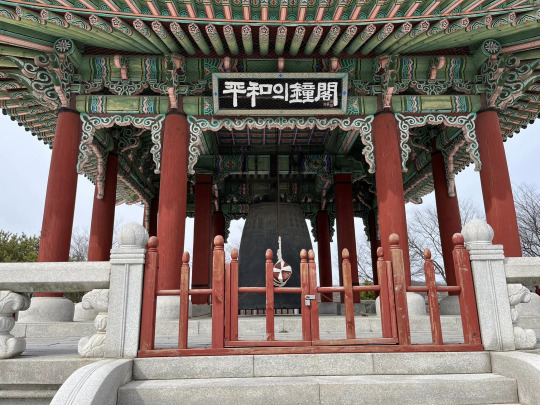

On our second proper day in Seoul, bleachpanda and I joined a Seoul City Bus tour (paid through Klook) to scope it out. Having prebooked the tour, we were contacted the day before by one of the organisers to arrange a hotel pick-up. By 9:30 AM, bleachpanda and I were in the hotel lobby, waiting for the bus to come pick us up. Except, instead of a bus, a nondescript black van showed up.
Into it we climbed until we arrived at another hotel before piling into the coach that pulled up, and which would take us to the DMZ.
Our first stop, after driving about an hour from Seoul, was the Peace Park. During the drive, our tour guide Yeoni, explained the history of Seoul - from the Joseon Dynasty to the modern reiteration we now know today. At Peace Park, Yeoni pointed out several important monuments including a bunker, a comfort women statue, the Iron Horse train engine, the Peace Bell and the infamous 'Cow Bridge'. Cow bridge is so named because a defector, and founder of Hyundai Groups, Chung Ju-yung sent over 1001 'unification' cows over the border as a gift.
After Peace Park, we headed back onto the coach and was taken to Dora Observatory. As we went through a security checkpoint, our passports were checked. My picture, of course, is horrendous as I didn't wear any make-up and the post office didn't retake my photo despite my fringe blocking a part of my face. After we had gone through the checkpoint, Yeoni told us of how visitors could take a train to visit the DMZ prior to COVID-19. This was run twice a day during the weekends with the train stopping at Dorasan station.

Once at Dora Observatory, Yeoni provided us some additional information about the relationship between North and South Korea. And as we peered through the binoculars, she was quick to point out key areas of interest. Bleachpanda and I even caught glimpses of a North Korean guard standing outside their outpost!
From Dora Observatory, we then headed to the 3rd tunnel. During the drive, Yeoni told us that there were about 1,000 defectors from North Korea annually. Often, defectors would flee first into China and find alternate means to enter South Korea. Once in South Korea, they would be assessed to see if they're spies sent from the north. If legitimate defectors, they are given free housing for a few years as well as a mentor to help them adjust to life outside of the communist state.
What was most telling to me was how these two nations, despite their differences, stilled hoped for unification and to once again be one people. Time will tell if it will come to pass but their stories of families being split apart reminded me of several other countries that endured such trauma including Partition and the ongoing challenges between China and Taiwan.
As for the 3rd tunnel, though reviews made it sound as if it was a claustrophobic spelunking crawl, it honestly felt like exploring a low-ceiling granite cave with sufficient space for two people to walk abreast. It certainly wasn't as impressive as investigating the twisting labyrinthine tunnels of Cappadocia last year.
The 3rd tunnel was simply a very long tunnel with a sharp incline at its entrance. Once in the tunnel proper, it was flat although there were patches of water here and there. While taller people might accidentally hit their hard hats on the ceiling, I was short enough to get through unscathed. At the end of the tunnel was a metal barricade and a monitor with four video feeds showing what lay beyond.
Bleachpanda, fearing the 3rd tunnel experience after reading reviews of it online, did not descend. Which, honestly, might have been a good idea as she would have needed copious breaks on the way out given how steep the incline was.
From the tunnel, our last stop on the DMZ tour was the Unification Village. It was here that bleachpanda treated me to a lemon tea. Something I desperately needed after the slog of a climb back up to the surface and running out of my pre-boiled water.
So ended our visit to the DMZ, with the Seoul City Bus dropping us all at City Hall. As bleachpanda and I wandered back to our hotel, we stopped to visit the now open Deoksugung Palace. What made it stand out to the two of us was its very modern western-style garden and fountain, known as the National Museum of Modern and Contemporary Art.
Pictures are as below:


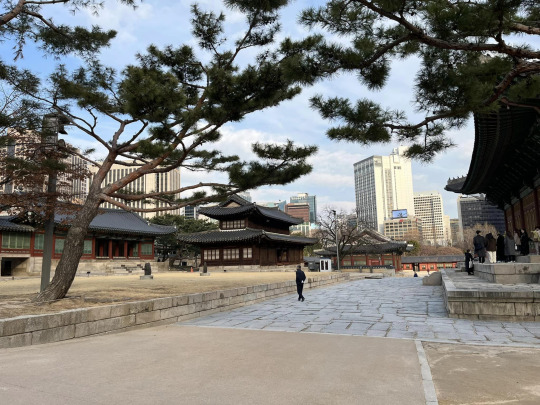
And while the visit to the DMZ was an eye-opening experience (my grandparents on my father's side actually met during the conflict although neither were on the frontlines), I couldn't help but feel I had missed an opportunity to chat with a few fellow Australians on the trip.
Still, I want to end his blog post by thanking Seoul City Tour, and Yeoni in particular, for taking us around the DMZ and safely getting us back to Seoul in one piece! You may have thought I was bleachpanda and the start but you certainly warmed to Kyndaris as the day went by. Even acknowledged us when we nearly missed the coach at the Peace Park because I had to search for a bin in order to throw the remains of my soy fried chicken away because the bus driver wouldn't let bleachpanda and I bring it along.
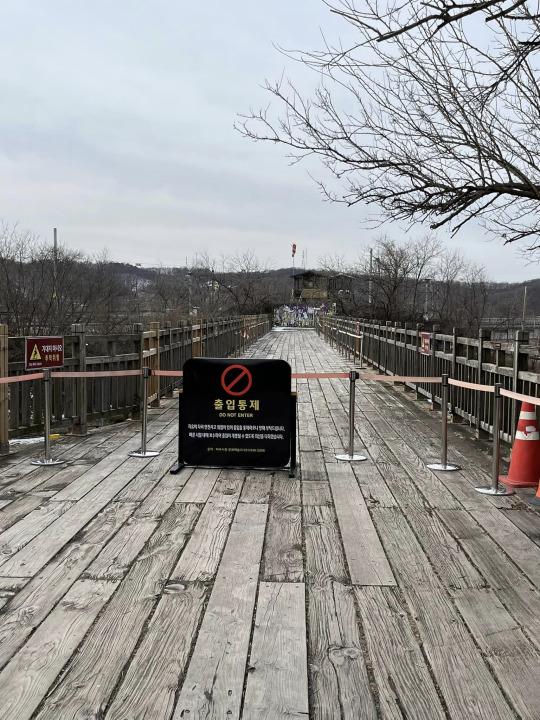


#personal blog#travel blog#travelling#seoul#dmz#38th parallel#peering into north korea#deoksugung palace#seoul city bus#video game and poem reference
3 notes
·
View notes
Text
The high cost of "self-funded" Democrats

It costs a lot to win a US election — even if it’s just a race for (formerly) low-stakes offices that have emerged as culture-war battlegrounds (like school and election boards). In the 12 years since Citizens United, the dark money firehose has turned many races into plute-on-plute economic warfare, where cash from the 1% matters far more than votes from the 99%.
Republicans have a structural advantage when it comes to moneyball elections, because they are the party of rich people (or, more specifically, the party of rich farmers who convince poor turkeys to vote for Christmas by appealing to racism, xenophobia, transphobia, homophobia, misogyny and other forms of bigotry).
It’s easy to make good on a campaign consisting of: “i) I will punish the people you hate and fear; ii) I will cut taxes for me and my rich pals; and iii) If governments were ever capable of doing good, that wisdom is lost to the ages, a forgotten art of a fallen civilization, like the secrets of pyramid-building. Today, the evil of governments is matched only by their incompetence.”
It’s really easy to govern incompetently, especially if you’re committed to defunding all the agencies that protect regular people so that you can save enough on your taxes to send your failsons to The Citadel at $35k/year.
For Democrats, this poses a problem. Decades of declining union membership (abetted, it must be noted, by Democratic leadership) has all but eliminated unions as a source of campaign funding and volunteers. But for the Democratic faction that wants the party to stand for the interest of the professional/managerial class, there is a solution: “decent” rich people who can self-fund their own campaigns.
This is a terrible idea, even by the standards of the Democrats’ neoliberal technocrat wing. The self-funded candidates who enter primary races are, at best, idiot dilletantes whose inherited wealth is derived from their having won a lottery by emerging from an extremely lucky orifice.
As Alexander Sammon writes for The American Prospect, party bosses love these fools because they are seen as bargains, candidates who won’t tax the party’s fundraising apparatus.
https://prospect.org/politics/democrats-self-funder-problem/
But there is a critical flaw in this logic: rich dilettantes make terrible candidates who lose elections to Republicans. Worse: because hereditary princelings can stay in primary races where they have no popular support, they can exhaust the fundraising resources of good candidates who can take must-win seats in the midterms.
Take Trudy Busch Valentine, the $215m scion of the Busch family, whose bid for the Dems’ Missouri senate nomination has been almost entirely funded out of her own pocket (85% of the $3m she’s spent came from her own bank account). She’s a really, really bad candidate. She can’t answer basic questions about a don’t-say-gay law:
https://www.kansascity.com/news/politics-government/article263832082.html
She can’t answer questions about a ban on health-care for trans kids:
https://www.advocate.com/politics/2022/7/27/dem-missouri-senate-candidate-flubs-trans-rights-position
And she literally didn’t know what Citizens United was (you can’t make this shit up):
https://twitter.com/BoldProgressive/status/1553838749062135809
If she becomes the nominee, she will lose.
But worse, if she becomes the nominee, it will be because she’s her primary opponent, an anti-monopoly crusader Lucas Kunce, who actually could win, because he will campaign on issues that make a material difference to the lives of Missouri voters. Hell, even if Kunce beats her in the primary, he’ll go into the senate race with a supporter base whose modest funds have been depleted fighting off this disastrous “self-funder.”
The thing is, this Missouri Senate race is Democrats’ to lose. The GOP candidates are a clown car: there’s the Trump-endorsed (accused) wife-beater Eric Greitens, and the stunting Eric Schmitt (who wasted public money suing China over covid while serving as the state’s AG). A good Democratic candidate could deliver a badly needed Senate seat.
In Wisconsin, meanwhile, there’s another chaotic Democratic primary, spoiled by failson Alex Lasry (who inherited his wealth from his billionaire hedge-fund looter daddy) and Sarah Godlewski, another plute who has poured millions of her own money into her campaign, staying in the race despite the fact that nearly all of her support came from her.
Both Lasry and Godlewski dropped out of the primary after spending a combined $18.5m of their own money to attack and drain the coffers of Mandela Barnes, who never debated a real candidate and effectively ran unopposed by any serious contenders. As Sammon writes, “their effectively infinite cash kept them in the race much longer than they otherwise would have been, without ever building a meaningful constituency.”
In New York City, millionaire Carolyn Maloney is bidding for the 12th District House seat, presumably on the popular appeal of her heavy stake in an “eviction happy rental apartment complex” — surely a big vote-getter for the Democratic base:
https://www.nydailynews.com/news/politics/nyc-pol-income-firm-evicts-struggling-tenants-article-1.3909463
In Michigan’s 5th District, Shri Thanedar has disgorged $5m from his own vast fortune despite his manifest weakness as a candidate; that money flushed out more Super PACs, including right-wing PACs (like United Democracy Project, a front for AIPAC) who’ve chummed the waters by dumping $5m more into the race.
We know how this turns out. The presidential bids of Michael Bloomberg, Howard Schultz and Tom Steyer demonstrate what should be obvious: dead-eyed billionaire wreckers and their fumbling, bumbling offspring are not popular with Democratic voters and will not win elections for Democrats. Bloomberg spent one billion dollars on his campaign and the only place he won was American Samoa, whose residents are denied votes in presidential elections.
And yet, self-funding continues to grow inside the Democratic party. Follow the Money’s report shows that between 2016 and 2018, the spending by self-funders in Democratic races rose from 4% of Democratic spending to 12% — $547.5m! It’s a sure thing that figure’s only gone up since:
https://www.followthemoney.org/research/institute-reports/self-funders-continue-to-falter
This will get worse. SCOTUS’s decision in FEC v Ted Cruz removed all limits from candidates ability to pocket their donors’ money to pay themselves back for the loans they make to their campaign, which allows billionaires to put millions into a campaign, then get other billionaires to bail them out with tax-free campaign donations.
This means that each member of America’s ruling class can serve as a one-person Citizens United, a dark money pool of their own making. It is another step on the road to government entirely run by centimillionaires and their orifice-lotto-winning larvae.
It’s not just that these are terrible candidates who will lose elections. It’s also that they will crowd out small-dollar-supported progressives like AOC, who campaign (and win) on popular issues that matter to and materially improve working peoples’ lives.
But of course, that’s the point.
75 notes
·
View notes
Text
How Increased Surveillance by the China Government during the Global COVID-19 Pandemic Affects Online Communities?

In the wake of the global COVID-19 pandemic, governments worldwide, including China, intensified surveillance measures to curb the virus's spread. In this context, China's implementation of stringent surveillance, notably through Health Code Apps, has raised profound concerns about its impact on online communities. As facial recognition and data collection become intrinsic to daily life, the potential repercussions on digital spaces and the people within them demand careful examination. This discussion delves into the multifaceted consequences of increased surveillance by the Chinese government and its tangible effects on the dynamics of online communities.
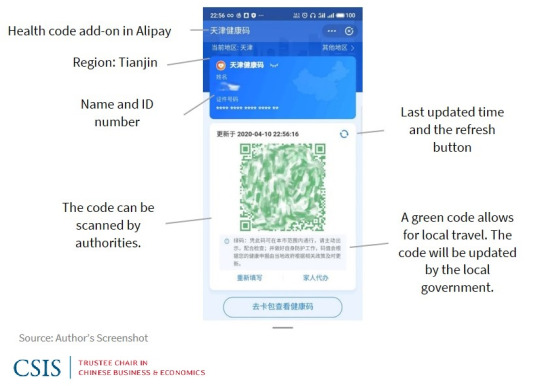

Privacy Erosion
In response to the global COVID-19 pandemic, various countries implemented measures to track and control the virus's spread, introducing tools such as contact tracing apps (Ojokoh et al., 2022), temperature checks (Qu & Lv, 2021) and travel restrictions (Burns et al., 2021). Simultaneously, In China, where stringent surveillance measures were already in place, the government leveraged technology to an even greater extent, using facial recognition and health QR codes to monitor citizens' movements. This involved the deployment of a series of applications known as "Health Code Apps," which have raised concerns about privacy erosion, particularly regarding the use of health code applications. Online communities are not immune to this erosion, as the data collected through these apps includes personal information, health status, and location details. This data is then utilized to assign one of three colours, indicating the user's health status (Ramos, 2020). However, Data is funnelled to entities like the provincial Big Data Bureau, Alibaba, and the telecommunications department, expanding the accessibility to user information, ranging from personal details to health status, location, and device specifics. This centralized model amplifies the risks of data aggregation and user re-identification, exemplified by the Beijing Health Bao system's data leak in December 2020. The incident exposed the photographs, ID numbers, and nucleic acid test information of celebrities, highlighting insufficient safeguards in place (Zhang, 2022). Online communities may find their members exposed to privacy breaches, leading to a chilling effect on open communication and expression within these digital spaces.

Potential for Abuse of Power:
The potential for the abuse of power in the context of surveillance, inadequate transparency and compliance measures is a significant concern for online communities as well. This concern is exemplified by recent events in Henan Province, where health code apps were allegedly manipulated to suppress protests related to potential losses in rural banks on the brink of collapse (Zhang, 2022). The legitimacy of these health code apps faced a setback as city officials marked over a thousand individuals as red, restricting their entry into Zhengzhou City and highlighting the vulnerability of such systems to misuse (Zhang, 2022). This incident underscores the potential for health code apps, initially designed for public health purposes, to transform into tools of surveillance, allowing government agencies to exert control under the guise of maintaining public health. The lack of stringent transparency requirements heightens the risk of these technologies being misused for purposes beyond their intended scope, which negatively impacts the freedom of expression within online communities. As governments exploit surveillance tools to monitor and influence online discussions, online communities may face challenges related to censorship and control, further emphasising the interconnected nature of surveillance concerns and their impact on digital spaces.
Technological Dependence:
Embracing extensive surveillance often involves a reliance on advanced technologies. In the case of Health Code Apps, facial recognition technology is integrated into residential area access control systems, permitting entry only to those with a green code (Ramos, 2020), which has implications for online communities. This reliance on advanced technologies may neglect more human-centric approaches to online interaction, potentially excluding or disadvantaging certain members of digital communities. As surveillance technologies become integral to online platforms, the balance between security measures and preserving the inclusivity and diversity of online communities becomes a critical consideration.
Trust Deficit:
The colour-coded system assigned by health code applications has far-reaching consequences for millions of users in their interactions within both physical and online communities. Requiring individuals to display their health codes in public transportation, shopping malls, markets, and other public places may contribute to a trust deficit between citizens and the online platforms they engage with (Jao et al., 2020). Users within online communities may question the motives behind such surveillance measures, especially if their personal information is shared without their knowledge. Rebuilding trust within online communities, once eroded by mandatory health code reliance, poses a considerable challenge, impacting the dynamics of digital social spaces.
In conclusion, the surge in surveillance by the Chinese government amid the global COVID-19 pandemic undeniably leaves a lasting imprint on online communities. The colour-coded system mandated by health code applications not only infiltrates public spaces but also infiltrates the very essence of digital interactions. This imposition triggers a tangible trust deficit within online communities as individuals question the motives behind these surveillance measures. Rebuilding trust within these virtual spaces, essential for vibrant and open communication, becomes a formidable challenge in the aftermath of mandatory health code reliance. The delicate equilibrium between bolstering security measures and safeguarding the inclusivity of online communities emerges as the linchpin for preserving the dynamic and diverse nature of these digital spaces. In essence, the impact of increased surveillance by the Chinese government is intimately intertwined with the well-being and resilience of online communities.
"Considering the implications of increased surveillance by the Chinese government during the global COVID-19 pandemic on online communities, we'd like to hear your perspective. How do you perceive the effects on privacy erosion, potential abuse of power, technological dependence, and the trust deficit within these digital spaces? Share your insights and cast your vote below."
Reference List
Burns, J., Movsisyan, A., Stratil, J. M., Biallas, R. L., Coenen, M., Emmert-Fees, K., Geffert, K., Hoffmann, S., Horstick, O., Laxy, M., Klinger, C., Kratzer, S., Litwin, T., Norris, S. L., Pfadenhauer, L. M., Von Philipsborn, P., Sell, K., Stadelmaier, J., Verboom, B., . . . Rehfuess, E. (2021). International travel-related control measures to contain the COVID-19 pandemic: a rapid review. The Cochrane Library, 2021(3). https://doi.org/10.1002/14651858.cd013717.pub2
Jao, N., Cohen, D., & Udemans, C. (2020). How China is using QR code apps to contain Covid-19. TechNode. https://technode.com/2020/02/25/how-china-is-using-qr-code-apps-to-contain-covid-19/
Ojokoh, B. A., Aribisala, B. S., Sarumi, O. A., Gabriel, A. J., Omisore, O. M., Taiwo, A. E., Igbe, T., Chukwuocha, U. M., Yusuf, T. A., Afolayan, A., Babalola, O., Adebayo, T., & Afolabi, O. (2022). Contact Tracing Strategies for COVID-19 Prevention and Containment: A scoping review. Big Data and Cognitive Computing, 6(4), 111. https://doi.org/10.3390/bdcc6040111
Qu, J., & Lv, X. (2021). The response measures to the coronavirus disease 2019 outbreak in China. Open Forum Infectious Diseases, 8(2). https://doi.org/10.1093/ofid/ofab014
Ramos, L. F. (2020). Evaluating privacy during the COVID-19 public health emergency. The ACM Digital Library, 176–179. https://doi.org/10.1145/3428502.3428526
Zhang, X. (2022). Decoding China’s COVID-19 health code apps: the legal challenges. Healthcare, 10(8), 1479. https://doi.org/10.3390/healthcare10081479
4 notes
·
View notes
Text
Manifesto for an Ecosocial Energy Transition from the Peoples of the South
An appeal to leaders, institutions, and our brothers and sisters
More than two years after the outbreak of the COVID-19 pandemic—and now alongside the catastrophic consequences of Russia’s invasion of Ukraine—a “new normal” has emerged. This new global status quo reflects a worsening of various crises: social, economic, political, ecological, bio-medical, and geopolitical.
Environmental collapse approaches. Everyday life has become ever more militarized. Access to good food, clean water, and affordable health care has become even more restricted. More governments have turned autocratic. The wealthy have become wealthier, the powerful more powerful, and unregulated technology has only accelerated these trends.
The engines of this unjust status quo—capitalism, patriarchy, colonialism, and various fundamentalisms—are making a bad situation worse. Therefore, we must urgently debate and implement new visions of ecosocial transition and transformation that are gender-just, regenerative, and popular, that are at once local and international.
In this Manifesto for an Ecosocial Energy Transition from the Peoples of the South, we hold that the problems of the Global – geopolitical – South are different from those of the Global North and rising powers such as China. An imbalance of power between these two realms not only persists because of a colonial legacy but has deepened because of a neocolonial energy model. In the context of climate change, ever rising energy needs, and biodiversity loss, the capitalist centers have stepped up the pressure to extract natural wealth and rely on cheap labor from the countries on the periphery. Not only is the well-known extractive paradigm still in place but the North’s ecological debt to the South is rising.
What’s new about this current moment are the “clean energy transitions” of the North that have put even more pressure on the Global South to yield up cobalt and lithium for the production of high-tech batteries, balsa wood for wind turbines, land for large solar arrays, and new infrastructure for hydrogen megaprojects. This decarbonization of the rich, which is market-based and export-oriented, depends on a new phase of environmental despoliation of the Global South, which affects the lives of millions of women, men, and children, not to mention non-human life. Women, especially from agrarian societies, are amongst the most impacted. In this way, the Global South has once again become a zone of sacrifice, a basket of purportedly inexhaustible resources for the countries of the North.
A priority for the Global North has been to secure global supply chains, especially of critical raw materials, and prevent certain countries, like China, from monopolizing access. The G7 trade ministers, for instance, recently championed a responsible, sustainable, and transparent supply chain for critical minerals via international cooperation‚ policy, and finance, including the facilitation of trade in environmental goods and services through the WTO. The Global North has pushed for more trade and investment agreements with the Global South to satisfy its need for resources, particularly those integral to “clean energy transitions.” These agreements, designed to reduce barriers to trade and investment, protect and enhance corporate power and rights by subjecting states to potential legal suits according to investor-state dispute settlement (ISDS) mechanisms. The Global North is using these agreements to control the “clean energy transition” and create a new colonialism.
Governments of the South, meanwhile, have fallen into a debt trap, borrowing money to build up industries and large-scale agriculture to supply the North. To repay these debts, governments have felt compelled to extract more resources from the ground, creating a vicious circle of inequality. Today, the imperative to move beyond fossil fuels without any significant reduction in consumption in the North has only increased the pressure to exploit these natural resources. Moreover, as it moves ahead with its own energy transitions, the North has paid only lip service to its responsibility to address its historical and rising ecological debt to the South.
Minor changes in the energy matrix are not enough. The entire energy system must be transformed, from production and distribution to consumption and waste. Substituting electric vehicles for internal-combustion cars is insufficient, for the entire transportation model needs changing, with a reduction of energy consumption and the promotion of sustainable options.
In this way, relations must become more equitable not only between the center and periphery countries but also within countries between the elite and the public. Corrupt elites in the Global South have also collaborated in this unjust system by profiting from extraction, repressing human rights and environmental defenders, and perpetuating economic inequality.
Rather than solely technological, the solutions to these interlocked crises are above all political.
As activists, intellectuals, and organizations from different countries of the South, we call on change agents from different parts of the world to commit to a radical, democratic, gender-just, regenerative, and popular ecosocial transition that transforms both the energy sector and the industrial and agricultural spheres that depend on large-scale energy inputs. According to the different movements for climate justice, “transition is inevitable, but justice is not.”
We still have time to start a just and democratic transition. We can transition away from the neoliberal economic system in a direction that sustains life, combines social justice with environmental justice, brings together egalitarian and democratic values with a resilient, holistic social policy, and restores an ecological balance necessary for a healthy planet. But for that we need more political imagination and more utopian visions of another society that is socially just and respects our planetary common house.
The energy transition should be part of a comprehensive vision that addresses radical inequality in the distribution of energy resources and advances energy democracy. It should de-emphasize large-scale institutions—corporate agriculture, huge energy companies—as well as market-based solutions. Instead, it must strengthen the resilience of civil society and social organizations.
Therefore, we make the following 8 demands:
We warn that an energy transition led by corporate megaprojects, coming from the Global North and accepted by numerous governments in the South, entails the enlargement of the zones of sacrifice throughout the Global South, the persistence of the colonial legacy, patriarchy, and the debt trap. Energy is an elemental and inalienable human right, and energy democracy should be our goal.
We call on the peoples of the South to reject false solutions that come with new forms of energy colonialism, now in the name of a Green transition. We make an explicit call to continue political coordination among the peoples of the south while also pursuing strategic alliances with critical sectors in the North.
To mitigate the havoc of the climate crisis and advance a just and popular ecosocial transition, we demand the payment of the ecological debt. This means, in the face of the disproportionate Global North responsibility for the climate crisis and ecological collapse, the real implementation of a system of compensation to the global South. This system should include a considerable transfer of funds and appropriate technology, and should consider sovereign debt cancellation for the countries of the South. We support reparations for loss and damage experienced by Indigenous peoples, vulnerable groups and local communities due to mining, big dams, and dirty energy projects.
We reject the expansion of the hydrocarbon border in our countries—through fracking and offshore projects—and repudiate the hypocritical discourse of the European Union, which recently declared natural gas and nuclear energy to be “clean energies.” As already proposed in the Yasuni Initiative in Ecuador in 2007 and today supported by many social sectors and organizations, we endorse leaving fossil fuels underground and generating the social and labor conditions necessary to abandon extractivism and move toward a post-fossil-fuel future.
We similarly reject “green colonialism” in the form of land grabs for solar and wind farms, the indiscriminate mining of critical minerals, and the promotion of technological “fixes” such as blue or grey hydrogen. Enclosure, exclusion, violence, encroachment, and entrenchment have characterized past and current North-South energy relations and are not acceptable in an era of ecosocial transitions.
We demand the genuine protection of environment and human rights defenders, particularly indigenous peoples and women at the forefront of resisting extractivism.
The elimination of energy poverty in the countries of the South should be among our fundamental objectives—as well as the energy poverty of parts of the Global North—through alternative, decentralized, equitably distributed projects of renewable energy that are owned and operated by communities themselves.
We denounce international trade agreements that penalize countries that want to curb fossil fuel extraction. We must stop the use of trade and investment agreements controlled by multinational corporations that ultimately promote more extraction and reinforce a new colonialism.
Our ecosocial alternative is based on countless struggles, strategies, proposals, and community-based initiatives. Our Manifesto connects with the lived experience and critical perspectives of Indigenous peoples and other local communities, women, and youth throughout the Global South. It is inspired by the work done on the rights of nature, buen vivir, vivir sabroso, sumac kawsay, ubuntu, swaraj, the commons, the care economy, agroecology, food sovereignty, post-extractivism, the pluriverse, autonomy, and energy sovereignty. Above all, we call for a radical, democratic, popular, gender-just, regenerative, and comprehensive ecosocial transition.
Following the steps of the Ecosocial and Intercultural Pact of the South, this Manifesto proposes a dynamic platform that invites you to join our shared struggle for transformation by helping to create collective visions and collective solutions.
We invite you to endorse this manifesto with your signature.
9 notes
·
View notes
Text
Is social media useful in spreading information on Covid-19 in Malaysia?
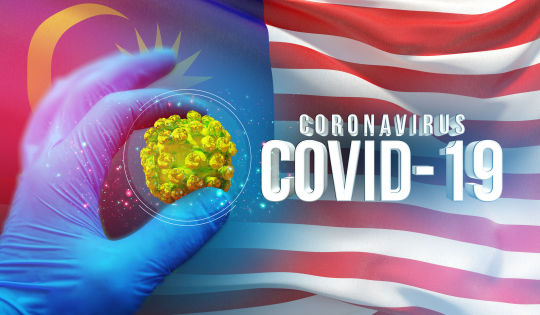
Covid-19 is claimed to have originated in Wuhan, China, in late December 2019 and ultimately expanded to 200 nations globally (Salman, 2021). Social media, with over billion users, is vital for Malaysia’s government to spread Covid-19 awareness timely and educate the public on precautionary conduct. Social media enables people to generate and share information while socializing, enabling the flow of opinions, notions, and insights in online communities (Hussin et al., 2021). Governmental initiatives to enhance public health via social media have sprouted in the last several years (Dawi et al., 2021).
Navigating the Pandemic Wave: How Social Media Amplified COVID-19 Response in Malaysia
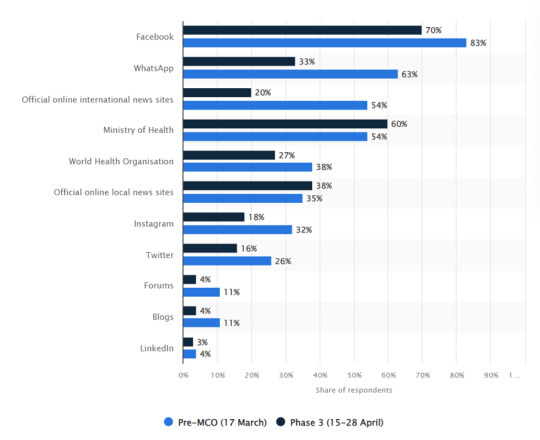
Malaysian citizens have access to Covid-19 updates through social media, including the official Facebook page, YouTube channel, and Twitter account of the Ministry of Health Malaysia, known as “Kementerian Kesihatan Malaysia (KKM)”. Besides, the Director-General of Health live-streams Covid-19 information on Facebook (Hussin et al., 2021). Notably, the Malaysian Ministry of Health and National Security Council reported Covid-19 cases on Facebook, WhatsApp, Telegram, and Twitter when Covid-19 initially affected Malaysia. This move was made because social media can approach individuals quickly with crucial information and updates.


Twitter represents one of the social media channels that the Malaysian government has selected in providing updates on the Covid-19 situation to alert people about maintaining good hygiene practices to prevent the spread of the virus and to share dos and don'ts during the outbreak (Hussin et al., 2021). It was overwhelming when users gave input, participated in online conversations, commented on status or live video broadcasting, tweeted the news, and shared within communities. Public questions, complaints, and misunderstandings can be published on government official pages for speedy replies. Social media content can change people's behavior and reduce the efficacy of government remedies. The Malaysian Ministry of Health (MOH) tweeted Covid-19 information, covering daily cases, deaths, new patients, discharges, hospitalization, and verified cases to caution the citizens (Hussin et al., 2021). Roughly 20 posts on SOP reminded Twitter users of SOPs such as business operations, purchasing processes, or social events daily. Additionally, MOH published 164 Covid-19 instructions and precautions. For instance, postings mentioned the red zone, where numerous cases were found, and special precautions. Notably, hashtags are frequently included to prioritize Covid-19 information from reliable organizations to make it easy for individuals for browsing later.

Empowering Malaysia’s COVID-19 Response: MySejahtera
In April 2020, the government launched the MySejahtera mobile application to assist individuals in tracking their health status and registering their locations, allowing authorities to collect timely information in fighting Covid-19 which had a positive impact on people's inclination to be involved in protective behaviours (Dawi et al., 2021). Public health guidelines were more probable to be followed when citizens realized the scenario and government response. The COVID-19 epidemic is updated daily by MySejahtera. For instance, this includes the cumulative confirmed cases and the daily new cases.

Dangers of Social Media Reliance during the COVID-19 Pandemic
Dissemination of False Information
Social media during the Covid-19 epidemic has enabled a rapid dissemination of unverified content, potentially deceiving and perplexing a considerable segment of the public. This encompasses misinformation about drinking warm salts or lemon water and taking hydroxychloroquine for curation (Balakrishnan, 2022). In Malaysia, a notable occurrence was the rise in the dissemination of false information pertaining to the lockdown measures and Covid-19-related information. This surge prompted Malaysian government to establish the Rapid Response Troop as a means to combat the proliferation of fake news, namely sebanarnya.my. Several instances of false information being spread in the country can be observed, such as the circulation of a compilation of locations within the Klang Valley that purportedly have a significant concentration of Covid-19 cases (Balakrishnan, 2022). Relying extensively on social media might increase dread, dissatisfaction, anxiety, and paranoia. Disinformation was spread in Malaysia by locals using fake or anonymous accounts (Salman, 2021). Many people detect deceptive information poorly, particularly on social media. Following the MCO's adoption, people panic-purchase and buy vast amounts of items and non-essentials at supermarkets (Ngadiron et al., 2021).
Disseminating false information is akin to spreading the Covid-19 virus. The battle against fake information persists, and the community requires daily education via diverse platforms. Social media platforms have a significant impact on fostering societal awareness and enhancing interpersonal connections within Malaysian communities. However, individuals should be cautious, as the proliferation of fabricated information on these platforms is intended to captivate netizens and generate sensationalized or trending discussions.
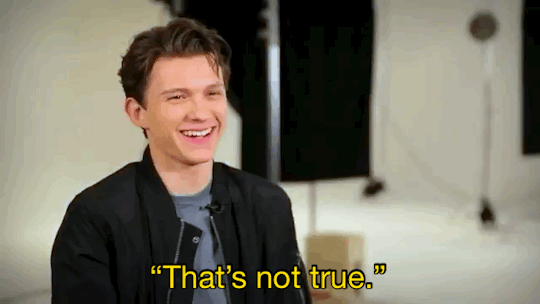
In my opinion, social media is useful in spreading essential COVID-19 information in Malaysia. It enables the government to swiftly provide updates, guidance, and safeguards to Malaysians. The MySejahtera mobile app, Facebook, and Twitter have allowed direct interaction with individuals, encouraging safety and behavioural alterations. Nevertheless, fighting disinformation is vital. Overall, social media is useful, but it demands careful scrutiny to guarantee information authentication.
List of References
Balakrishnan, V. (2022). COVID-19 and fake news dissemination among Malaysians – motives and its sociodemographic correlates. International Journal of Disaster Risk Reduction, 73, 1-8. https://doi.org/10.1016/j.ijdrr.2022.102900
Dawi, N. M., Namazi, H., Hwang, H. J., Ismail, S., Maresova, P., & Krejcar, O. (2021). Attitude toward protective behavior engagement during COVID-19 pandemic in Malaysia: The role of e-government and social media. Frontiers in Public Health, 9, 1-8. https://doi.org/10.3389/fpubh.2021.609716
Hussin, R., Rahman, S. H. A., & Azudin, N. (2021). Social media approach to crisis communication during COVID-19 pandemic: An analysis from Malaysian perspective. Ulum Islamiyyah, 33(S5), 77–88. https://doi.org/10.33102/uij.vol33nos5.404
Ngadiron, S., Aziz, A. A., & Mohamed, S. S. (2021). The spread of COVID-19 fake news on social media and its impact among Malaysians. International Journal of Law, Government and Communication, 6(22), 253–260. https://doi.org/10.35631/ijlgc.6220024
Salman, A. (2021). Knowledge, curiosity, communication channels and panic during COVID-19 movement control order. International Journal of Media and Communication Research (IJMCR), 2(1), 1–11. https://doi.org/10.25299/ijmcr.v2i1.6205
Statista. (2022). Distribution of main news sources during MCO COVID-19 Malaysia 2020. https://www.statista.com/statistics/1118979/malaysia-main-news-sources-during-covid-19/
6 notes
·
View notes
Text
Public Health Campaigns & Communities
What is public health?
Public health, as a multidisciplinary field, is dedicated to enhancing the health and overall well-being of communities (Lee, 2023). It strives to create safe environments for people to live, learn, work, and enjoy their lives. Many people mistakenly believe that public health is the same as healthcare. However, it is important to distinguish between the two, as public health focuses on entire populations with the objective of preventing illnesses and injuries, while the healthcare industry concentrates on treating individual patients who are already sick (APHA, 2023).
For example, public health is responsible for the following:

"Public health is the science and art of preventing disease, prolonging life, and promoting health through the organized efforts and informed choices of society, organizations, public and private communities, and individuals." — Winslow, 1920
The 10 Essential Public Health Services
The 10 Essential Public Health Services (EPHS), first created in 1994 by a federal working group, serves as the description of the activities that public health systems should undertake in all communities. EPHS is organised around the three core functions of public health: assessment, policy development and assurance. Health departments and community partners collaborators across the nation structure their work around the EPHS model, while educational institutions and public health programs also incorporate it into their teachings (CDC, 2023).
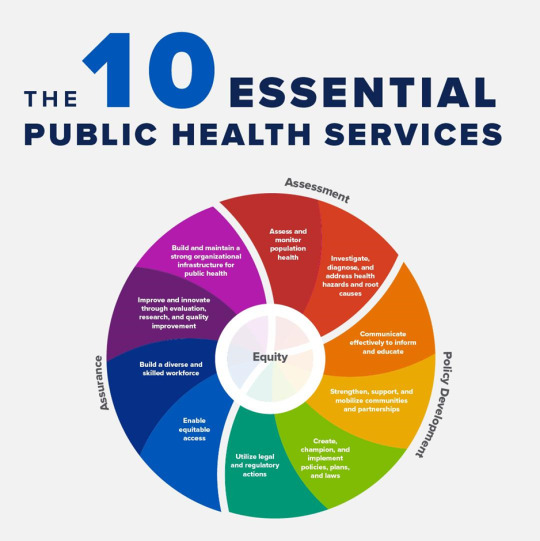
In 2020, a revised version of the 10 EPHS was unveiled during a virtual launch event. The revised EPHS centres around equity and promotes policies that enable optimal health for all and seek to remove systemic and structural barriers such as poverty, racism, gender discrimination and others, that have resulted in health inequities (CDC, 2023).
“The revised 10 EPHS not only centres equity but acknowledges the importance of community voice and the different roles public health plays.” — Jessica Fisher, Vice President of Strategic Initiatives at Public Health National Center for Innovations (PHNCI).
COVID-19 and Public Health
COVID-19, caused by an infection of the SARS-CoV-2 virus, was initially detected in December 2019 in Wuhan, a city in China's Hubei province. The COVID-19 pandemic has posed a substantial threat to nations across the world, and it is regarded as the biggest public health crisis the world has confronted in over a century (Miyah, 2022). In late 2020, the World Health Organisation (WHO) declared the COVID-19 outbreak as a Public Health Emergency of International Concern in which countries with vulnerable healthcare facilities may be at an excessive hazard (Tabari, 2020).
In response to this crisis, many countries have enacted travel restrictions, including flight suspensions and measures to limit incoming travellers. Others have introduced social distancing and quarantine policies as well as encouraging the reduction of social interactions, postponing events, locking down schools, and isolating suspected cases. Furthermore, some regions have utilized telemedicine for remote consultations and monitoring during the outbreak (Tabari, 2020).
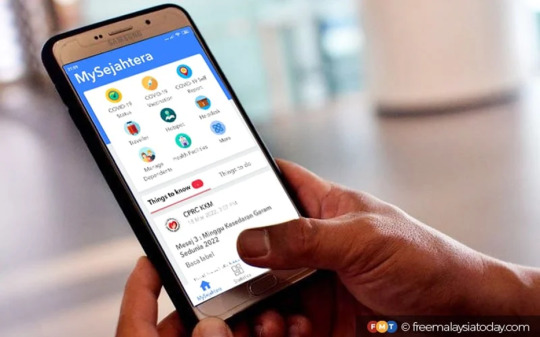
MySejahtera is a mobile app developed by the Malaysian government to support various aspects of public health throughout the COVID-19 pandemic. This app enables citizens to conduct self-health assessments, track their health status, and communicate information with the Ministry of Health (MOH), so that necessary actions could be implemented.
Here are its primary functions:
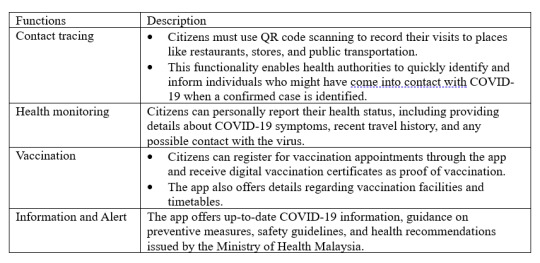
Explore https://www.maaedicare.org/wp-content/uploads/2021/11/MySejahtera_compressed.pdf for detailed function and process of using MySejahtera.
Mental Health Problem Attribute to Social Media
Last but not least, mental health is a crucial aspect of public health, and the well-being of individuals, particularly those in the 16-24 age group, is a matter of significant concern. A survey conducted in Malaysia in May 2022 revealed that a considerable portion of young respondents in this age range reported experiencing heightened levels of stress and anxiety over the past year (Statista Research Department, 2023). Furthermore, this research suggests that social media plays a substantial role in contributing to this mental health problem.
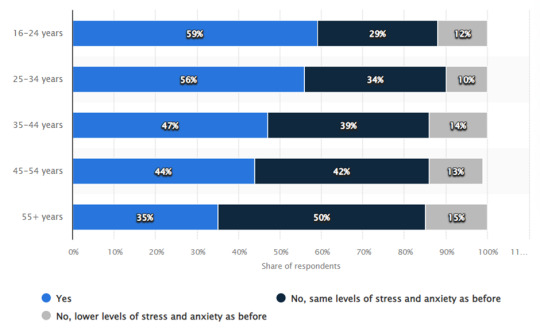
Source: Statista Research Department, 2023
Multiple studies have demonstrated a strong connection between heavy use of social media and the risk for mental health issues (Robinson, 2023). Social media platforms can be hotspots for the dissemination of hurtful rumours, lies and online harassment. About 10 percent of teens report being bullied on social media and many other users are subjected to offensive comments (Robinson, 2023). Additionally, fear of missing out (FOMO) can compel someone to pick up their phone every few minutes to check for updates, or compulsively respond to every alert. When individuals prioritize online interactions over in-person relationships, they become more vulnerable to mood disorders, such as anxiety and depression.

These findings highlight the importance of recognizing the influence of social media on mental health, especially among young adults. In summary, striking a balance between the advantages of digital connectivity and the preservation of mental well-being is crucial to ensure that social media serves as a positive and constructive tool in the lives of young individuals.
References:
American Public Health Association. (n.d.). What is public health. https://www.apha.org/what-is-public-health
CDC. (2021). Public health system and the 10 essential public health services. Centers for Disease Control and Prevention. https://www.cdc.gov/publichealthgateway/publichealthservices/essentialhealthservices.html
C.-E. A. Winslow, The Untilled Fields of Public Health.Science51,23-33(1920).DOI:10.1126/science.51.1306.23
Lee, D., Chen, K., & Kruger, J. S. (2023, January 1). Chapter 93 - Public health (A. E. M. Eltorai, J. A. Bakal, P. C. Newell, & A. J. Osband, Eds.). ScienceDirect; Academic Press. https://www.sciencedirect.com/science/article/abs/pii/B9780323903004000616
Malaysia: stress levels by age group 2022. (2023, August 25). Statista. https://www.statista.com/statistics/1322323/malaysia-share-of-people-feeling-more-stressed-or-anxious-by-gender/#:~:text=According%20to%20a%20survey%20on
Miyah, Y., Benjelloun, M., Lairini, S., & Lahrichi, A. (2022). COVID-19 Impact on Public Health, Environment, Human Psychology, Global Socioeconomy, and Education. TheScientificWorldJournal, 2022, 5578284. https://doi.org/10.1155/2022/5578284
Robinson, L., & Smith, M. (2020, September). Social Media and Mental Health - HelpGuide.org. Https://Www.helpguide.org. https://www.helpguide.org/articles/mental-health/social-media-and-mental-health.htm#:~:text=Since%20it
Tabari, P., Amini, M., Moghadami, M., & Moosavi, M. (2020). International Public Health Responses to COVID-19 Outbreak: A Rapid Review. Iranian journal of medical sciences, 45(3), 157–169. https://doi.org/10.30476/ijms.2020.85810.1537
World Health Organization (WHO). (2022, June 17). Mental Health. World Health Organization. https://www.who.int/news-room/fact-sheets/detail/mental-health-strengthening-our-response
2 notes
·
View notes
Text
Dumbest Thing I've Ever Heard: 7/20/2023
Third Place: Rand Paul
Speaking on Kudlow yesterday, Senator Paul said the following regarding giving military funding to Ukraine:
From a fiscal conservative perspective, it makes no sense to borrow money from China to send it to Ukraine. It’s not like we’re sending them surplus funds. It’s like, "Oh, we have surplus ammo around." We’re actually out of ammo now, we’re out of money. And so, there’s no real sense in continuing to do this.
Of course, this is the same nonsense I covered J.D. Vance saying two days ago--so expect this to be the new Republican Party line for the foreseeable future. However, we are by no means "out of ammo," the United States has spent years having the largest military in the world, to the point where The Pentagon itself has said it no longer needs new equipment. Also, the money we'd be borrowing would more than likely not come from China, given only about five percent of our national debt is money borrowed from China--Japan is a far bigger foreign creditor than China is, for the record. Most of our debt, two-thirds to be exact, is actually owned by American investors.
Second Place: Jim Jordan
The Ohio Congressman made two absurd claims at today's hearing, first arguing that Hank Aaron died from the COVID-19 vaccine and also claiming that the Biden White House censored Robert F. Kennedy Jr. in January 2021 because of his status as Biden's primary challenger.
The first claim fails to make sense because an autopsy found that Aaron died of natural causes because, you know, he was 86 at the time. The second point falls apart when you remember that Biden couldn't have censored Kennedy because he was challenging the President in January 2021, since Kennedy didn't announce his campaign until April 2023.
Winner: Nicholas Kristof
Last night, the New York Times columnist published a piece called "When Children Are Bought and Sold" which serves as little more than a puff piece for the Coalition Against Trafficking in Women, which best as I can tell is an anti-sex work organization pretending to be an anti-human trafficking organization.
The article tells the story of Melanie Thompson, who was a victim of human trafficking at a young age. Although her story is a tragic one, the fact that this--and other concerns regarding human trafficking--are used by Kristof in this column to argue against decriminalization of sex work is something I cannot ignore. Especially given ninety percent of sex work is done by consenting adults. In spite of that, this outlier is treated as the norm, with Kristof writing at one point:
Melanie scoffs at the view that pimps are business partners of women selling sex. “I never touched the money,” she told me. “And if you got caught trying to stash anything, it was not good for you.”
What's especially telling is that, despite this being a rather extreme situation, this is the only story the article tells. We don't get a single anecdote of sex workers who are consenting to their job and working happily, even though--as I just mentioned--they make up the vast majority of cases. (It's not even as if such a thing would be hard. John Stossel managed to do that several years ago, specifically through having them confront anti-sex work activists.) This would be on the same level as me saying it should be illegal to work for an energy company, and my only example being the story of one person who worked at Enron. Or, how about I say it should be illegal to run a newspaper because one newspaper--the most read one in the country--used it influence to help make sure the SMITH Act passed through Congress, which was used to silence leftists all throughout the 1940s and 1950s, because they were worried Eastern European immigrants into the United States would--gasp--take us to war with Hitler. (For those unaware, yes, The New York Times actually did that.)
The article does note that "one large global study found that legalization is associated with more trafficking," however, the substitution effect means that legal sex work will be preferred over illegal sex work, driving the traffickers out of the market. For that matter, since New Zealand's decriminalization of sex work in 2003, not a single case of human trafficking has come out of the sex industry. You see, it turns out actual data is complicated and can't be explained away with the worst case scenario.
Nicholas Kristof, you've said the dumbest thing I've ever heard.
4 notes
·
View notes